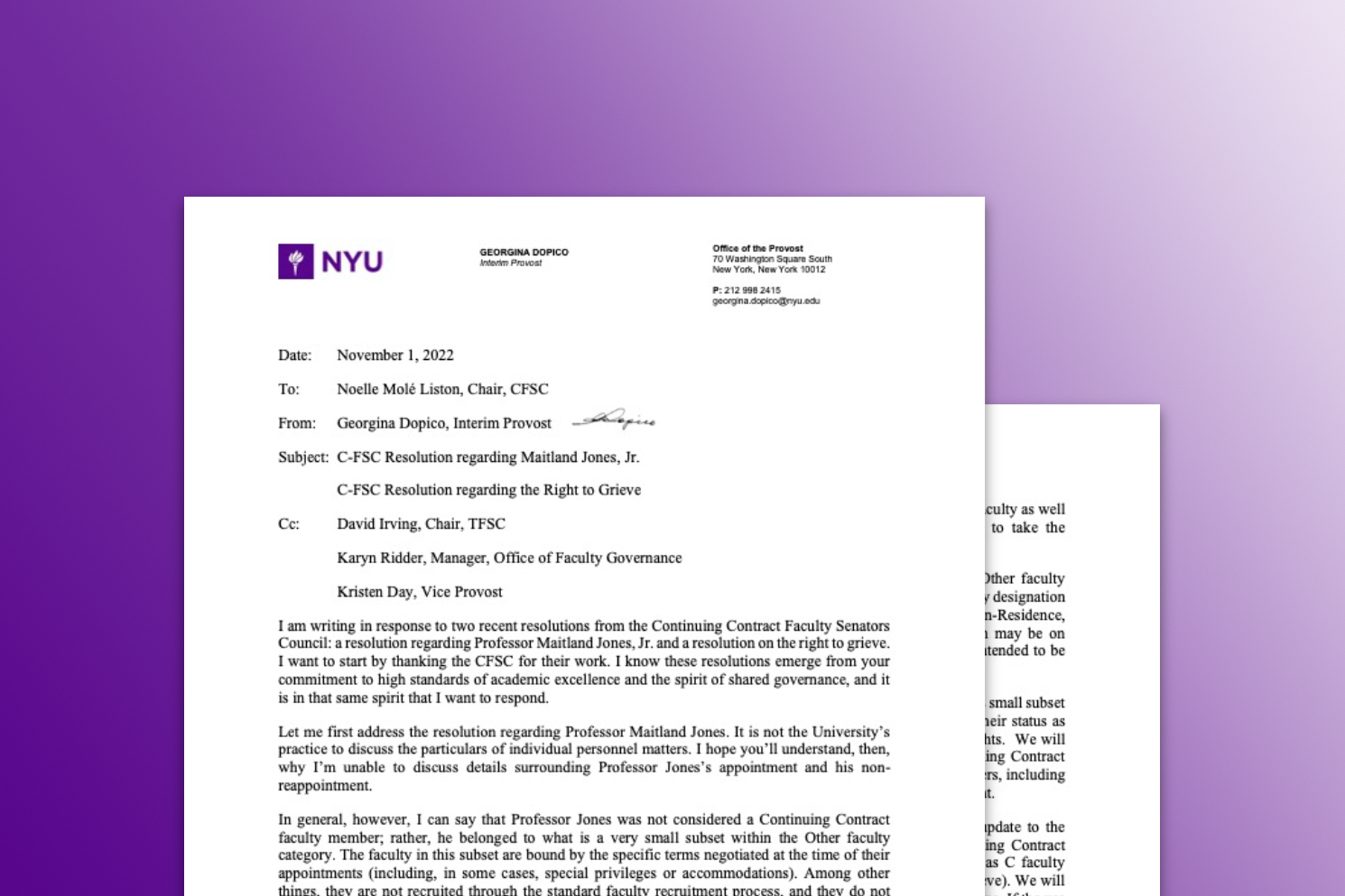NYU has proposed amending its Faculty Handbook and renegotiating contracts to address faculty concerns following the firing of chemistry professor Maitland Jones Jr. The teachers who initially complained were not impressed.
Last month, a group of faculty members passed a resolution in the University Senate calling on NYU to open a formal investigation into the firing of Maitland Jones Jr., a professor of organic chemistry who was abruptly fired from the university. In response to the resolution, the university said it would revise some employment-related policies and definitions in the faculty handbook.
However, some faculty members are unhappy with NYU’s response and say the university still hasn’t adequately explained the circumstances surrounding Jones’ termination.
“The story of Professor Jones’ firing has already gone around the world,” Heidi White, who sits on the university senate committee that called for the investigation, told WSN. “Are we helping the university now by shutting down the investigation and trying to cover up this whole thing? It won’t make it go away. Instead, he will return until the administration does what the Senate panel has asked.”
White said several senators representing contract faculty are disappointed with the university’s response. She said the letter did not address the circumstances surrounding Jones’ firing, nor did it provide an adequate explanation to the contract teachers concerned.
A group of senators representing the university’s contract faculty adopted a resolution on October 13, calling for an investigation and a formal statement to NYU administrators to explain why Jones’ contract was terminated. Twenty-six senators voted in favor and one abstained; no one voted against the resolution.
Interim Provost Georgina Dopica responded to the board Nov. 1, detailing the actions the university plans to take in response.
“I understand how difficult this case has been for the entire NYU community,” Dopic said in a response. “However, I hope it will benefit both our faculty and our students: on the one hand, greater transparency about faculty appointment categories and grievance rights than we owe to your resolution; on the other, a dialogue about how NYU can become a true leader in STEM education and beyond.”
Jones told WSN that he supported the board’s resolution when it was sent to the university. However, he did not approve of the university’s response. Jones said he believes the university is taking steps to correct problems for which he refuses to take responsibility.
“The chief basically said, ‘We didn’t do anything wrong, and we’re going to stop,'” Jones said.
The letter from Dopico explained that the university’s practice of releasing details about individual faculty matters is not routine, so the specifics of Jones’ case were not addressed.
Along with the resolution against Jones, faculty senators passed a related resolution on faculty grievance rights, which allows most NYU faculty members to file formal complaints with the university about the terms and conditions of their contracts and the termination of their contracts. Both resolutions highlighted the confusion caused by Jones’ specific faculty appointment.
Jones was placed under a small staff category called “other faculty,” separating him from adjunct, contract, and tenure-track faculty. According to the administrators, he made such a designation does not have the right to file an official complaint about his dismissalwhich led other faculty members to raise concerns about their own contractual rights at NYU.
NYU spokesman John Beckman did not respond to questions about why Jones was identified as “another faculty member.”
According to Dopico’s response, which Beckman said was part of an “ongoing conversation,” the university will no longer be hiring in the “other faculty” category. Instead, the designation will only be used for those who were already considered part of that category. “Other faculty” now includes only writers-in-residence, artists-in-residence, global professors, global visiting professors, and faculty members whose positions are short-term or “visiting.”
Currently, NYU has about a dozen professors listed as “other faculty,” according to Dopico. The University has undertaken to contact them to review their situation and the grievance rights to which they are entitled. If any of these faculty members wish to upgrade to a tenure-track faculty category that would allow them to make a formal complaint to the University, they will be given the opportunity to do so.
The University is also proposing to amend the Faculty Handbook to clarify the meaning of all faculty titles. If, under this policy change, NYU finds that some “other faculty” do not fit the new role description, the provost’s office will work with individual schools to change those positions.
Dopico also promised that the university would not unilaterally convert a contract faculty member to a member of “another faculty.”
Elizabeth Fay, an organizer for the as-yet-unrecognized NYU contract faculty union and a professor in the university’s College of Arts and Sciences said contract faculty still don’t have an explanation for why Jones is considered “another faculty member.” The group continues to demand an official response from the university, Fay said.
Fay added that contract faculty are in a particularly vulnerable position because their union is not recognized — unlike adjuncts or graduate students who support university-recognized unions.
“Contract faculty currently have no clear avenues to appeal such decisions, which is one of the reasons most of us signed cards asking NYU to recognize our union and respect our right to collective bargaining.” — Fay told WSN. “Adjunct faculty and graduate students are not fired without due process, and there is never any confusion as to which faculty position they hold because their rights are protected by a legally binding union contract.”
Contact Abby Wilson at [email protected]







